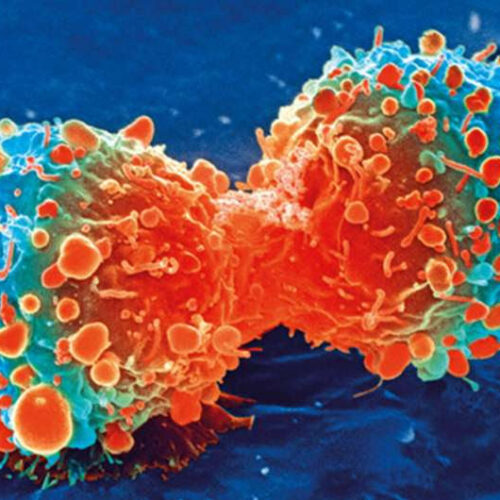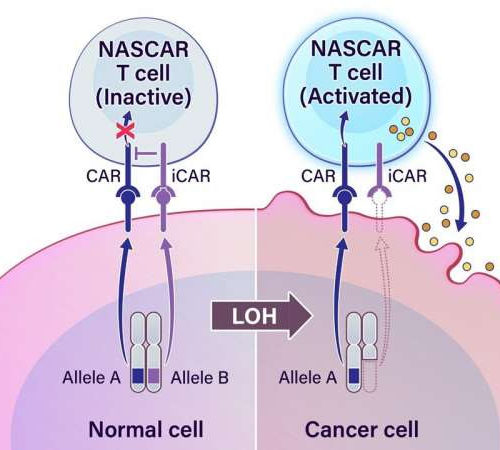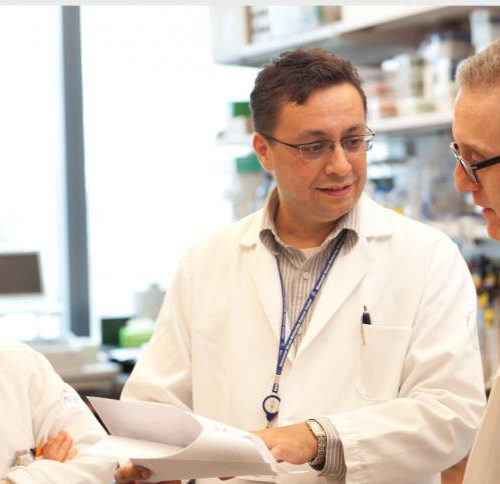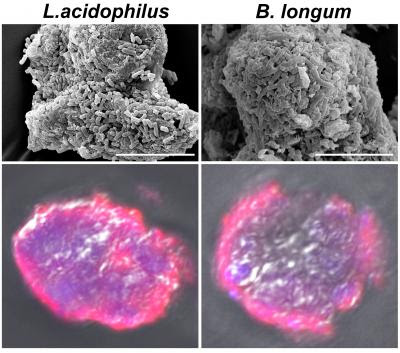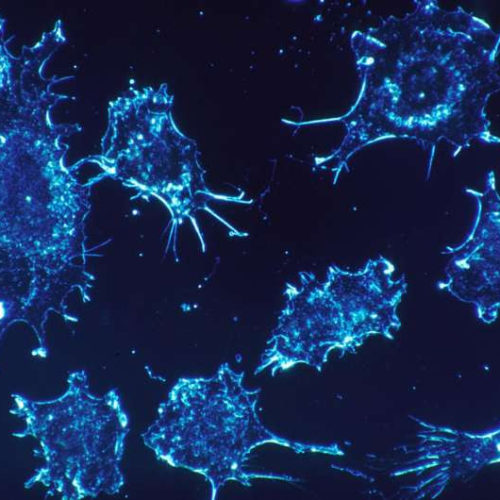by Kyoto University Cancer cell during cell division. Credit: National Institutes of Health Cancer immunotherapies have made the news for their startling effectiveness against certain cancers. However, current clinical therapies mainly use the patient’s own cells, limiting the number of patients who have access to this cure. CiRA Professor Shin Kaneko is developing iPS cells technology...
Tag: <span>Cancer Immunotherapy</span>
Cancer immunotherapy may also treat certain autoimmune diseases
MICHIGAN MEDICINE – UNIVERSITY OF MICHIGAN A team of researchers has found disrupting the interaction between cancer cells and certain immune cells is more effective at killing cancer cells than current immunotherapy treatments. The findings, which include studies in cell lines and animal models, appeared in JCI Insight and focus on a protein called CD6 as a target for a...
Cancer immunotherapy approach targets common genetic alteration
by Johns Hopkins University School of Medicine Novel cancer immunotherapy approach inverts a missing gene copy into an immune cell-activating signal. Credit: Elizabeth Cook Researchers developed a prototype for a new cancer immunotherapy that uses engineered T cells to target a genetic alteration common among all cancers. The approach, which stimulates an immune response against cells that...
Suppressive immune cells’ metabolic vulnerability may be targeted for cancer immunotherapy
LUDWIG INSTITUTE FOR CANCER RESEARCH IMAGE: TAHA MERGHOUB AND JEDD WOLCHOK OF THE LUDWIG CENTER AT MEMORIAL SLOAN KETTERING CANCER CENTER (MSK) AND FORMER POSTDOC ROBERTA ZAPPASODI CREDIT: LUDWIG CANCER RESEARCH FEBRUARY 15, 2021, NEW YORK – A Ludwig Cancer Research study has identified a novel mechanism by which a type of cancer immunotherapy known...
An mRNA vaccine for cancer immunotherapy
AMERICAN CHEMICAL SOCIETY Messenger RNA (mRNA) vaccines to prevent COVID-19 have made headlines around the world recently, but scientists have also been working on mRNA vaccines to treat or prevent other diseases, including some forms of cancer. Now, researchers reporting in ACS’ Nano Lettershave developed a hydrogel that, when injected into mice with melanoma, slowly released...
Smectite promotes probiotic biofilm formation in gut for cancer immunotherapy
NANJING UNIVERSITY SCHOOL OF LIFE SCIENCES IMAGE: SMECTITE MICROSPHERES SPECIFICALLY SUPPORT THE TYPICAL PROBIOTICS, L. ACIDOPHILUS AND B. LONGUM TO FORM BIOFILMS ON THE SURFACE. CREDIT: LEI DONG, NANJING UNIVERSITY Scientists from Nanjing University and the University of Macau have devised a new approach to extend the survival of transplanted probiotics in vivo, enhancing the...
Response to cancer immunotherapy may be affected by genes we carry from birth
UNIVERSITY OF CALIFORNIA – SAN FRANCISCO For all their importance as a breakthrough treatment, the cancer immunotherapies known as checkpoint inhibitors still only benefit a small minority of patients, perhaps 15 percent across different types of cancer. Moreover, doctors cannot accurately predict which of their patients will respond. A new study finds that inherited genetic...
Fecal transplant turns cancer immunotherapy non-responders into responders
by University of Pittsburgh Credit: CC0 Public Domain Researchers at UPMC Hillman Cancer Center and the National Cancer Institute (NCI) demonstrate that changing the gut microbiome can transform patients with advanced melanoma who never responded to immunotherapy—which has a failure rate of 40% for this type of cancer—into patients who do. The results of this proof-of-principle phase...
Another side to cancer immunotherapy? Scientists investigate intertumoral B cells
by Catherine Williams, Emory University Orange represents tumor cells displaying the HPV antigen p16, while green represents B cells with the arrows indicating germinal center-like structures. Immunotherapies have transformed the treatment of several types of cancer over the last decade. Yet they focus on reactivating one arm of the immune system: cytotoxic T cells, which sniff...
Scientists engineer new cancer immunotherapy to train immune system in cancer fight
THE MOUNT SINAI HOSPITAL / MOUNT SINAI SCHOOL OF MEDICINE New York, NY (October 29, 2020) — A groundbreaking new type of cancer immunotherapy developed at the Icahn School of Medicine at Mount Sinai trains the innate immune system to help it eliminate tumor cells through the use of nanobiologics, tiny materials bioengineered from natural...

